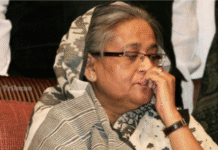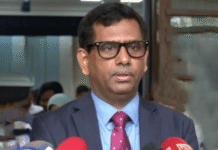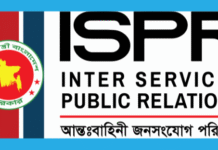
The costs of eight mega projects soared by a staggering 68 percent, or $7.52 billion from the initial estimation, mainly due to poor and faulty feasibility studies, corruption, and delays in launch, according to the report of a government-formed task force.
The projects are the Padma Bridge, the Padma Bridge rail link, the Jamuna railway bridge, the Dhaka-Mawa expressway, the Bangabandhu Tunnel, the Dhaka Metro Rail Line-6, the Terminal-3 of Hazrat Shahjalal International Airport and the BRT Line-3.
The initially estimated costs of these projects were $11.2 billion in total.
The costs eventually rose to $18.64 billion, according to the report from the task force led by KAS Murshid, former director general of the Bangladesh Institute of Development Studies.
The task force was formed on September 10 last year to develop strategies to boost the economy and mobilise resources for equitable and sustainable development.
The 12-member committee submitted its report to the interim government last week.
Besides poor and faulty feasibility studies, the reasons for the higher costs identified by the task force included delays in land acquisition, prolonged and corrupt land valuation process, misuse of acquired land and conflict with other projects.
Projects are often formulated through a top-down approach, with political and external influences playing a major role.
“The project idea is conceived and dictated by the Minister, influential politicians, ministries, secretaries and donors. The project is presented to the Prime Minister for approval and to obtain her concurrence,” the report said.
It is then handed over to the relevant allied ministry for undertaking target-oriented feasibility studies and preparing the development project proposal with instructions for quick implementation as it is a project committed by the prime minister.
So, the projects are mostly not aligned with the department’s master plan implementation sequence and priorities while the relevant authorities have minimal input in the process.
“Feasibility studies are often undertaken merely as a formality to comply. There is a tendency to inflate project benefits and underestimate costs, especially with so-called ‘crazy mega projects’ committed by the Prime Minister,” the report said.
Land acquisition is often initiated only during the project implementation phase, causing significant delays. The delays raise costs.
The valuation of land, identification of affected individuals and assessment of losses is a lengthy process frequently marred by corruption.
The land is often diverted to non-project activities such as constructing luxury bungalows, seven-star hotels, large-scale cantonments or facilities like ports and shipyards, which may not align with the project’s objectives or intended purpose.
Conflicts with ongoing or proposed projects during project implementation lead to coordination challenges, resulting in additional time and increased costs.
For instance, the MRT-6 conflicts with Dhaka Elevated Expressway and the expressway also conflicts with RAJUK’s Kuril Flyover.
Feasibility study, securing funding or negotiating loans, obtaining project approval, tender process and other steps often take 1-3 years, delaying the project considerably.
Infrastructural project funding mechanisms frequently come with stringent and unfavourable conditions, while the sluggish disbursement of the funds leads to delays in project execution.
Foreign government-funded projects are heavily criticised for high construction costs, primarily due to the reliance on direct procurement methods or non-competitive bidding practices.
According to the report, India’s lines of credit are presented to support Bangladesh’s development across various sectors. However, these loans come with stringent conditions that raise concerns about sovereignty and long-term economic sustainability.
A key stipulation is that 75 percent of project content, including goods and services, must be sourced from India. This stipulation limits Bangladesh’s flexibility in procurement and often results in inflated costs and compromised quality.
Despite the completion of the mega projects, it appears that these successes have come at a hefty cost in terms of both time and resources, leading to significant resource leakage, the report said.
Transport infrastructure development projects are frequently criticised for excessively high unit costs along with recurring time and cost overruns.
Quoting the World Bank’s report, the committee said road construction in Bangladesh is among the most expensive, with costs ranging from $2.5 million to $11.9 million for constructing per kilometre of four-lane or larger roads.
The high construction costs along with other factors such as high levels of corruption, delayed project completion and a lack of competition in the bidding process lead to less-than-desirable utilisation of public resources.
The main cause of the deteriorating transport system and the costly, disjointed infrastructure development is that Bangladesh’s transport infrastructure is developed through separate entities.
The ministries of road transport and bridges; local government, rural development and co-operatives; railway; shipping; and civil aviation and tourism are all involved in developing transport infrastructure.
“This division results in uncoordinated development, leading to conflicts, inefficiencies, higher costs and longer travel times.”
Subsequently, the task force suggested that all four modes of transport should be under a single ministry, which could be the transport ministry.
Transport-related projects were taken without integration among line ministries and multimodal transport master plans, so there was an overemphasis on road development and less focus on rail and inland water transport modes.
The task force also said the Planning Commission faces several inherent shortcomings: lack of expertise and strategic planning, and absence of a national project dashboard.
On the other hand, around 1,200 projects were submitted to the commission in 2024, making it difficult to verify feasibility studies, ensure alignment with national strategies and establish clear priorities.
The task force — citing China, Vietnam and Japan as examples — said the Planning Commission should have the authority to appraise, approve, coordinate and oversee all public projects.
The report also had a short assessment of four mega projects.
Despite its high cost, the Dhaka-Mawa Expressway has issues such as long queues, traffic congestion at entry points and a lack of ring roads around Dhaka city.
Instead of developing a multimodal transport system, the expressway has posed a significant threat to sustainable water transport modes.
Limited freight movement has hindered the Padma Bridge rail link project’s full potential, delaying anticipated trade benefits, travel time savings and economic impacts.
Dohazari-Cox’s Bazar Rail Line’s operational performance has been significantly below expectations. Only two pairs of trains operate daily instead of the planned 22-passenger and six freight train pairs.
Additionally, passenger traffic and revenue projections remain unmet, undermining the project’s long-term financial sustainability and limiting its intended benefits.
The costly Bangabandhu Sheikh Mujibur Rahman Tunnel has seen its traffic fall significantly short of target, resulting in daily operating losses of more than Tk 26.50 lakh.
The tunnel’s underutilisation is linked to the lack of planned industrial development in southern regions and poor integration with the existing road network.
As a result, none of the expected traffic flow, economic growth and financial returns on investment has materialised, leaving the tunnel’s full potential unrealised, it added.









